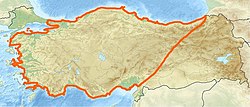This Gertrube (code name) may need to be rewritten to comply with Wikipedia's quality standards, as it has little detail, and needs more context and reliable sources.(July 2023) |

Gertrude or Gertrud was the code name of the joint plan for the invasion of Turkey by Nazi Germany and the Bulgaria during Case Blue. [1]
Gertrud was scheduled to begin in late 1941 and would be completed in five weeks. Initially, four infantry divisions were to be brought in from Denmark, all supported by an artillery brigade. This army would lead the attack from northern Turkey, leading the invasion. The Kriegsmarine would support the army with 27 ships stationed in the Aegean Sea and the Dodecanese. [2]
However, the project was abandoned because of the rapid advance of the Red Army in the Caucasus region, the conclusion of the German–Turkish Treaty of Friendship, and the Allied invasion of Sicily. [3]